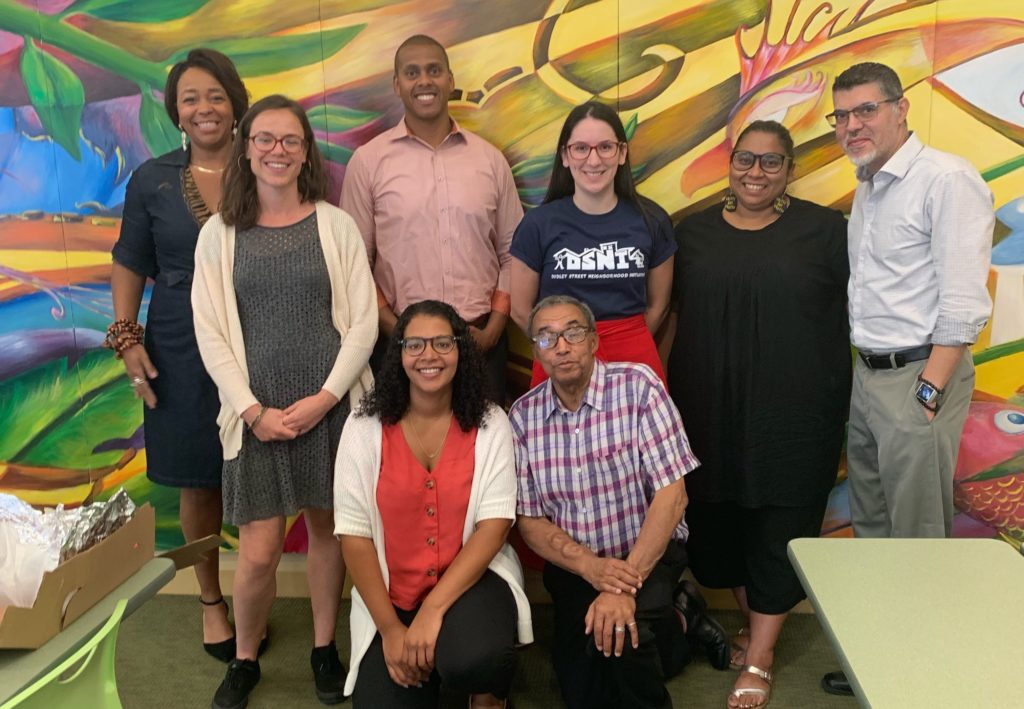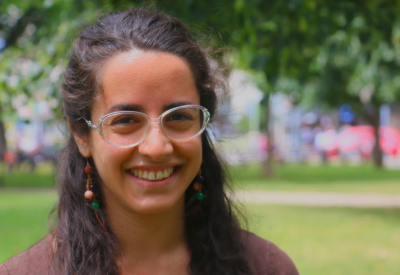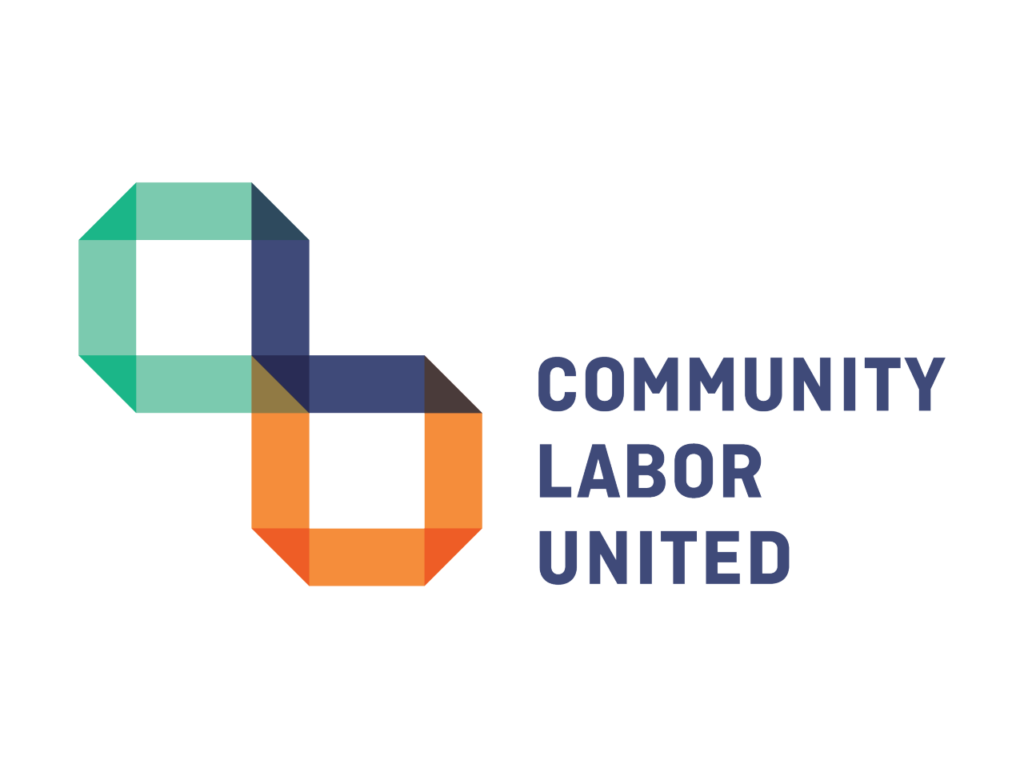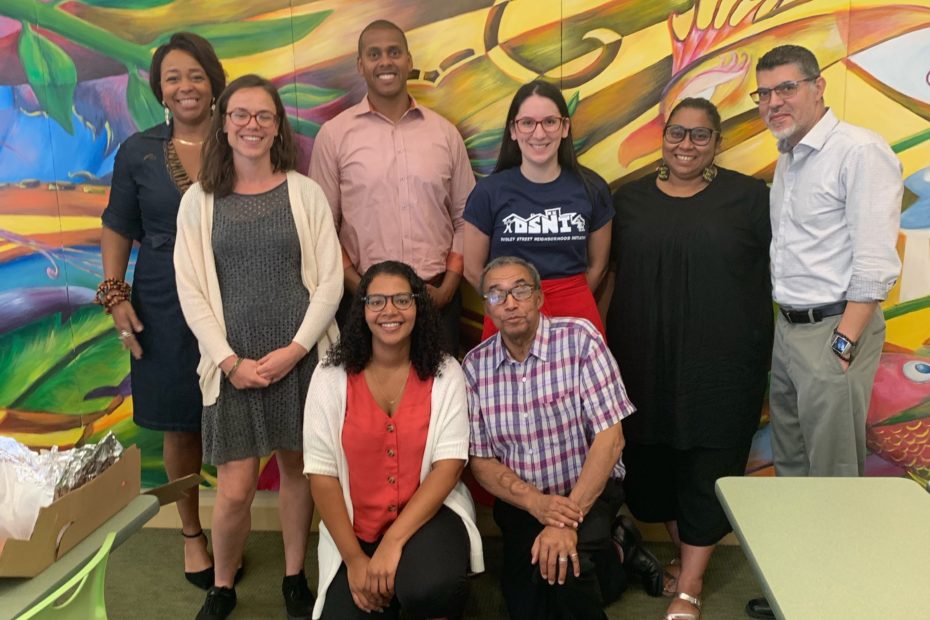This guest post was first published as “Summer 2019 CORE-Tisch Fellows Work With DSNI and CLU” on Professor Penn Loh’s Practical Visionaries blog on November 21, 2019. The original article can be viewed here.
In summer 2019, the Co-Research/Co-Education (CORE) program at Tufts Urban & Environmental Policy and Planning (UEP) placed two graduate students with the Dudley Street Neighborhood Initiative and Community Labor United, with support of the Tisch Summer Fellows program, a program of the Tisch College of Civic Life. Savannah-Nicole and Luisa report on their summer experiences below.
UNDERSTANDING VISION THROUGH PRACTICE
By Savannah-Nicole Villalba
During the summer of 2019 I was a graduate fellow at the Dudley Street Neighborhood Initiative (DSNI). I worked primarily with Dudley Neighbors Incorporated (DNI), a subsidiary of DSNI. DSNI’s mission is to empower “Dudley residents to organize, plan for, create, and control a vibrant, diverse, and high-quality neighborhood in collaboration with community partners.”
This opportunity was made possible through the Tufts UEP CoRE partnership and the Tufts Tisch Summer Fellows program. The CoRE program “moves beyond the typical one-off project model of community engagement towards a more reciprocal, place-based model in which both university and community partners ‘co-learn’ and ‘co-produce’ knowledge.” The Tisch Summer Fellows program “offers substantive internships that allow Tufts students to gain real-world skills, grow their networks, and explore career paths while building stronger communities on a local, national, or international level.” Throughout my ten weeks at DSNI I provided support for the staff on a variety of projects, including the Annual Meeting and Board Elections, and helped expand their library of maps and geospatial data pertinent to their community.
“The most salient takeaway I had this summer was observing first-hand what strong community engagement looks like in practice.”
In the Tufts Urban and Environmental Policy and Planning Program (UEP), we are called ‘Practical Visionaries.’ Throughout my first year of classes, I spent a lot of time envisioning and learning what community engagement was, the various forms it can take, and ways to ensure you are reaching a community in the best way possible. Many of my foundational classes brought in speakers who were involved in facilitating community engagement for an assortment of reasons. While I found every speaker, reading, and conversation with my professors and peers valuable, working with DSNI and experiencing what community engagement looks like in practice truly solidified the process for me.
The 2019 Annual Meeting and Board Elections is an event that will always come to mind when I think about community engagement. We had over 160 people come to the event and 40 candidates run for the board. Community members, supporters of the organization, and past and current DSNI and DNI staff all came together to make this event possible. In class, we discussed how it can be difficult to facilitate large community meetings. This was not the case on that warm night in June.
I began my night signing in community members, candidates, and supporters of the organization. You could feel the elation of everyone in the room: people were hugging, laughing, catching up, and seemed genuinely excited to be at the event. After everyone was signed in, I had the opportunity to watch the past Executive Director, Denise Barros, and the DNI Director, Tony Hernandez emcee the room in such a way that amplified the energy. Listening to candidates proclaim their love for their community, goals for the future, and ideas to help DSNI facilitate a stronger community process was a very special moment for me. It was in that moment that a strong example of community engagement was no longer something I had read or heard about; I was experiencing it in person.

As a graduate student who hopes to serve communities through municipal planning, I often think about the manifest and latent functions of the profession. The manifest function of planning is to advance the values, vision, and goals of a community through regulation and law. With this line of thought, the latent function should be that the desires of the community are being met through the regulatory processes which preserve the community’s vision for future generations. However, as we learn in class, there are many unfortunate examples where government officials do not implement regulations or laws that align with the community’s interest and goals and as a result, they suffer greatly. Spending my summer at DSNI was integral for me as a future practical visionary: I can confidently say through my experience and education I have an understanding of community engagement. I hope to facilitate community engagement through municipal planning with the same level of commitment that DSNI does for the Dudley Village.
RESEARCH FOR SOCIAL MOVEMENTS
By Luisa Santos
I had the opportunity to serve as a CoRE-Tisch Summer Fellow this summer with Community Labor United (CLU), an organization that works in coalition with base-building organizations to develop, advance, and fight for social-movement-based policies. This fellowship was significant for me to update my understanding of what a “career” as a social changemaker could look like. As someone who is interested in action research, doing co-research and co-education with CLU was critical to my development as both a researcher and an organizer.

Working with CLU helped ground my understanding and approach to movement-based research. Over the summer I learned practical skills that are essential for advancing social movements, such as how to do strategic corporate research, how to communicate complex information to a broad audience, and how to use research to advance campaigns. On a team, I conducted corporate research to support CLU’s childcare campaign and synthesized this vast information into a narrative that we developed into a teaching module to share with activists, organizers, and members of CLU’s base who are affected by Boston’s childcare policies, to better inform their advocacy and direct actions.
In addition to this work, I and the other summer interns at CLU participated in an inaugural “movement research cohort” multi-day workshop through which we discussed ideas and learned skills such as introductory Python, project management, and working with data sets using various methods. This series of conversations and knowledge exchanges helped develop our capacity as researchers committed to advancing social movements, while building a support system to do so. I was able to develop a more situated understanding of how movements for transformational change can be best carried out, from an organizational and movement-building perspective.

Overall, while the experience of learning and practicing strategic corporate research for real-world campaigns was a helpful exercise for me as a growing researcher-organizer, the real value of the 10-week internship was the building of relationships with people from the organization and within the movement. Working with UEP alum and CLU Senior Researcher Sarah Jimenez allowed me the opportunity to discuss theory and practice and explore possible career trajectories through dialogue with a seasoned researcher. Having daily interactions with CLU’s staff, who all have a wealth of knowledge and experience in the organizing world of Boston, I was further able to broaden my sense of the opportunities for social-change work and understand how I might fit in. Learning from and fighting alongside CLU’s extensive network and coalition, and practicing solidarity by participating in direct actions for CLU’s campaigns, gave me even greater insight and access to this vast and well-developed ecosystem of grassroots organizations struggling for social change in Boston. These connections further rooted me into the rich soil of the social movements of Boston, which will be of immeasurable value as I continue to forge my path as a practical visionary.

I’m really enjoying your blog. My son is there now. He has had most of his new adult experiences in Japan, graduating from college, finding his first apartment, signing a lease, working (nearly) full time. It’s weird for me that he’s having all these experiences there and not in the states. I appreciate that your blog is a window into that world. Thanks! I’m coming to visit later this year; I hope to be enchanted.
Comments are closed.